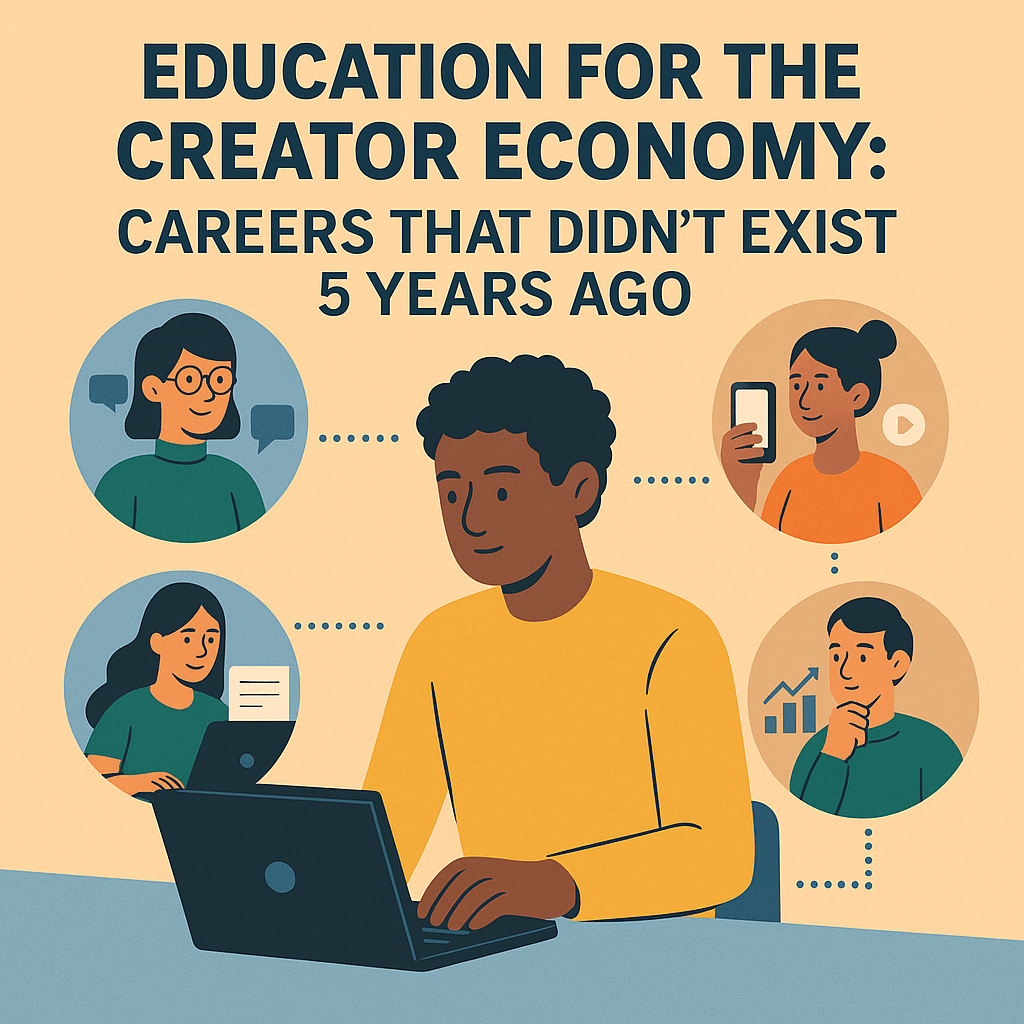The digital world has always been in motion, but the rise of the creator economy has accelerated change at a pace that few could predict. In less than a decade, platforms such as YouTube, TikTok, Twitch, and Substack have not only shaped entertainment and media but also given birth to entirely new professions. Careers that were virtually unheard of five years ago are now legitimate paths, attracting millions of people worldwide.
This article looks at how education is adapting to prepare individuals for this new era and highlights some of the most promising careers that have emerged from the creator economy.
What Is the Creator Economy?
The creator economy refers to the ecosystem built around individuals who create digital content and monetize it through platforms, brands, or their own audiences. Unlike traditional employment, creators often build independent businesses by producing value in the form of videos, podcasts, blogs, newsletters, courses, or even virtual experiences.
According to recent reports, the creator economy has grown into a multi-billion-dollar industry, with more than 200 million people worldwide considering themselves content creators in some capacity. While not everyone turns this into a full-time career, the demand for support roles, technology solutions, and new skills is undeniable.
Read:- How to Become a Pilot in India
Why Education Needs to Evolve
Traditional education systems were built around industries such as law, engineering, medicine, and finance. However, these systems have been slow to adapt to careers that rely on digital platforms, audience engagement, and community management.
The reality is that young professionals entering today’s workforce may find roles that their parents never imagined. As a result, education has to expand beyond conventional subjects and begin incorporating practical, creator-driven skills such as:
-
Digital storytelling: Writing, video editing, and visual communication.
-
Audience analytics: Using data to understand and grow communities.
-
Brand collaboration: Negotiating with sponsors and managing partnerships.
-
Platform literacy: Understanding how algorithms influence reach.
-
Entrepreneurship: Treating content creation like a sustainable business.
Schools, universities, and private academies are slowly building courses that reflect this shift, but in many cases, individuals are learning directly through online communities, peer mentorship, and independent practice.
Read:- Air Traffic Controller
Careers That Didn’t Exist Five Years Ago
Here are some of the most prominent creator economy careers that have emerged recently. Each highlights how education and training must adapt to support the next generation.
1. Community Manager for Independent Creators
Previously, community management was primarily a corporate role. Today, individual creators hire dedicated managers to oversee Discord servers, Patreon groups, and private communities. These professionals handle engagement, moderation, event planning, and customer support.
Education angle: Training in psychology, communication, and online moderation strategies is becoming vital for this field.
2. Short-Form Video Strategist
With TikTok, Instagram Reels, and YouTube Shorts dominating attention spans, the demand for specialists who understand vertical video trends has skyrocketed. A strategist guides creators on scripting, editing styles, audio choices, and timing.
Education angle: Courses in media production, trend analysis, and mobile-first storytelling prepare students for this fast-moving career.
3. Virtual Brand Collaboration Manager
Influencer marketing isn’t new, but the complexity of negotiations has grown. Creators now require brand collaboration managers who can evaluate offers, track ROI, and handle long-term partnerships without compromising authenticity.
Education angle: Business schools and digital marketing courses are beginning to add modules on influencer economics and contract negotiation.
4. Digital Merchandising Designer
Five years ago, merchandising was limited to large creators with established followings. Today, platforms like Shopify, Printful, and Teespring allow even small creators to launch their own product lines. Digital merchandising designers create mockups, manage eCommerce stores, and design items that align with a creator’s identity.
Education angle: Combining design education with eCommerce training gives students a pathway into this hybrid role.
Read:- Forensic Scientist Career
5. Live Stream Producer
While streaming existed before, the role of a professional live stream producer is relatively new. These individuals manage technical setups, overlays, interactive polls, and monetization features during broadcasts on Twitch, YouTube, or Kick.
Education angle: Audio-visual courses, technical directing, and interactive media studies are foundational for this career.
6. Creator Economy Analyst
Brands want measurable results before investing in creators. Enter the creator economy analyst a specialist who studies engagement data, audience demographics, and platform algorithms to produce actionable insights.
Education angle: This career blends data science, digital marketing, and behavioral analytics, showing the need for interdisciplinary education.
7. Newsletter Growth Manager
Email newsletters have returned as a powerful medium thanks to Substack and Beehiiv. The role of a newsletter growth manager involves writing content, testing subject lines, optimizing subscriber funnels, and building monetization strategies.
Education angle: Journalism, copywriting, and marketing courses are beginning to adapt by teaching skills specific to newsletter-driven businesses.
How Education Can Prepare Students
The shift toward the creator economy requires rethinking both formal and informal education. Here are some ways institutions can prepare students:
-
Introduce Creator-Centric Courses
Universities should create courses in creator economy management, digital monetization, and personal brand building. -
Encourage Project-Based Learning
Students should gain hands-on experience by running mock channels, creating content, or managing simulated communities. -
Bridge the Gap Between Business and Creativity
A sustainable creator career blends artistic expression with financial literacy. Courses should combine creative production with budgeting, taxes, and contracts. -
Highlight Mental Health and Resilience
The creator economy is known for burnout. Education must also emphasize mindfulness, sustainable work practices, and the importance of balance. -
Promote Lifelong Learning
Since platforms evolve quickly, creators and support professionals need to constantly update their skills through online courses, workshops, and peer networks.
Read:- Forest Range Officer
The Future of Learning in the Creator Economy
The creator economy is not a passing trend. As technology advances, it will continue to expand into virtual reality, artificial intelligence, and new social platforms. Education must remain flexible, responding quickly to the ever-changing needs of creators and their support teams.
Five years from now, we may see careers that are impossible to predict today roles focused on AI content moderation, virtual avatar management, or metaverse event design. The challenge for educators will be anticipating these shifts and preparing learners with adaptable skills rather than rigid knowledge.
Conclusion
The rise of the creator economy has rewritten the definition of a career. Jobs that didn’t exist five years ago are now legitimate, profitable, and sought after. Education systems—both formal and informal must evolve to give aspiring professionals the tools they need to succeed in this rapidly changing landscape.
Whether it’s through structured courses, peer learning, or self-driven experimentation, the key lies in building adaptable skills that combine creativity, data, and entrepreneurship. For students, educators, and policymakers, this is a reminder that the future of work is already here and it’s being shaped by creators.




Comments
0 comments